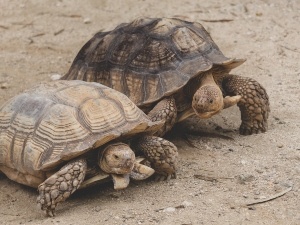
Tortoises make a variety of noises, they squeak, they quack, they make clicking noises and they whistle. You may be alarmed when you hear your pet tortoise whistle for the first time and this is understandable.
This article looks into why your tortoise may be squeaking.
Table of Contents
Tortoise making whistling noise:
While your pet making unknown noises isn’t automatically a sign that there is something wrong with the animal it is important to understand why your pet makes these noises.
Here is why your tortoise may be making a whistling noise:
Clogged nose:
One reason why your pet turtle may be whistling may be that its nostril is clogged with debris.
The air passing the debris when the turtle inhales may be causing the animal to produce whistling sounds.
The smaller airways, caused by the debris, make the airways narrower, just like when you make the opening of your mouth smaller to whistle.
The air passing through this small area will cause the tortoise’s nose to whistle.
What to do:
This isn’t something that you’d need to worry about, the debris that is stuck in your pet tortoise’s nose will eventually be breathed out by your reptile and the animal will go back to breathing normally.
You should avoid trying to get the debris out with tweezers, doing this can injure the inside of the animal’s nose. If you need to, you can take your pet to the vet to have the debris removed.
Respiratory infection:
The whistling sounds coming from your tortoise may signal the onset of a respiratory infection. Wheezing can also be heard in the early stages of a tortoise suffering a respiratory infection.
Other signs to look out for if you think that your tortoise has a respiratory infection are difficulty breathing, a loss of appetite, weight loss, lopsided swimming, bubbles or discharge coming from the animal’s mouth, open mouth breathing, and a decrease in energy.
If the animal is still eating and acting normally other than the whistling then this means that the infection has not progressed, but your pet would still need to be treated, this is the best time to treat your pet.
This condition can turn into pneumonia which can be life-threatening for your pet, so, action needs to be taken as soon as possible.
What to do:
The best way to tackle a respiratory infection in your pet tortoise is to take it to a vet, or better yet, take it to a herp vet.
The vet will run lab tests to determine what exactly caused the infection. Bacteria usually cause these infections, if this is the case, with your pet then the animal will be given antibiotics to clear the infection.
If you suspect that your pet has a respiratory infection, but you can’t immediately get the animal to the vet, then isolate the animal.
Isolating your sick tortoise will keep it from infecting the other tortoises in the enclosure.
Isolating the sick animal will also keep it from having to compete for food and water with the other tortoises in the enclosure while in its weak state.
If you enjoyed this article then you may also be interested in other turtle/tortoise related articles. Here are some articles that you may be interested in: Baby Tortoise Crying Noise At Night Sick, Why Is My Turtle Making Clicking Noises?, Tortoise Making Whistling Noise When Eating, Tortoise Clicking Jaw, Tortoise Swollen Neck, Tortoise Gasping, Baby Tortoise Gasping, Why Is My Tortoise Squeaking At Night?, Sulcata Tortoise Making Clicking Noise

